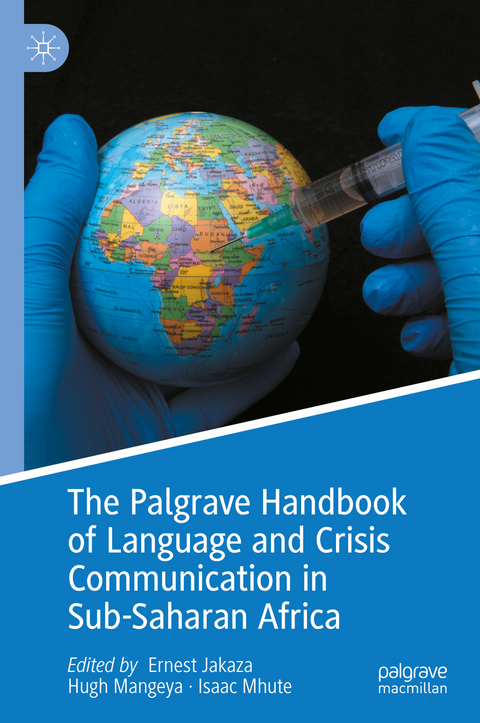
The Palgrave Handbook of Language and Crisis Communication in Sub-Saharan Africa
Springer International Publishing (Verlag)
978-3-031-43058-9 (ISBN)
lt;b> Ernest Jakaza is a Senior Lecturer in the Department of Languages, Literature and Cultural Studies at Midlands State University, Zimbabwe.
Hugh Mangeya is a Senior Lecturer in the Department of English and Communication at Midlands State University, Zimbabwe.
Isaac Mhute is an Associate Professor in the Department of English and Communication at Midlands State University, Zimbabwe.
Part A. Political crisis/ disaster Communication.- Chapter 1. Maintaining a coherent corporate identity on the face of politically rooted crisis (Bhowa Jairos Kudakwashe and Rusere Misheck).- Chapter 2. Question Time: A Bonus or Pain in the Quest for Political Accountability in the Zimbabwean Parliament (Mutsvairo Jack and Dlali Mawande).- Chapter 3. A comparative analysis of government social media crisis and risk communication during the COVID-19 health crisis (Kembo Shupikai).- Chapter 4. Brand and reputation management during political crises (Shura Tawanda and Jakaza Ernest).- Chapter 5. Sanctions discourse and strategic communication: Re-imagining a new Zimbabwe from a social conflict paradigm (Marevesa Tobias).- Chapter 6. Ubuntu in Languaging "From Politics of Rhetoric to The Second Republic": Re-reading Shimmer Chinodya's Harvest of Thorns in Discourse of New Dispensation (Mavengano Esther).- Chapter 7. Multilingualism in crisis and disaster management in sub-Saharan Africa: the enigma for Zimbabwe (Mavesera Miidzo and Madziko Innocent).- Chapter 8. The role of research for crisis and disaster management communication: a case of the Zimbabwean government (Mhute Isaac).- Chapter 9. Contradictory politics and the mutation of Crisis in post-colonial Zimbabwean Urban Clean-up Campaign (Mtingwende Andrew).- Chapter 10. Linguistic strategies used by the Ministry of Health and Child Care in Zimbabwe to sensitise citizens on COVID-19 in print media (Mutonga Lovemore, Gotosa Kudzai and Mugari Victor).- Chapter 11. Covid-19 Related Information: The Politics in Crises and Disaster Management Communication (Ndhlovu Nokukhanya Gratcheni, Muleya Ekem and Akpan Udoh James).- Chapter 12. Crisis communication in politically charged environments: A stakeholder approach (Rusere Winnie and Sigauke Misheck).- Chapter 13. Pursuing the 'disaster' of managing communication during a crisis: Zimbabwe's unending 'woes' (Saidi Umali).- Chapter 14. The pros and cons of social media in disaster management. a focus on Zimbabwe (Komboni Farisai Raymond).- Chapter 15. Disaster Risk Governance: The politics of crisis and disaster management in Southern Africa (Tondoi Clemence Ray).- Part B. Conceptualising Crisis and Disaster Management Communication.- Chapter 16. Models/ strategies of planning, managing, and responding to a crisis/ disaster (Mukurazhizha Rudo).- Chapter 17. Introduction to a theoretical framework of disaster and crisis management: Transactional Theory of Persuasion, Coercion and Manipulation (TTPCM) (Hondo Mkhululi).- Chapter 18. The efficacy of devolved disaster risk governance in Zimbabwe: A review of the communication approaches (Zvokuomba Kwashirai, Kabonga I, Chikoko W, Nyabeze K, and K, Mwapaura).- Chapter 19. Rethinking Effective Communication a Panaceato disaster management. A Critical Discourse Approach (Jongore Magret and Chirimuuta Chipo).- Chapter 20. Forecast based financing, a tool for early warning communication and proactive response mechanism (Komboni Farisayi Raymond, Muchena Richard and Kwenda Benjamin Makuwire).- Part C. Media Crisis/ Disaster Communication.- Chapter 21. An Infodemic within a Pandemic: Assessing the Role of Social Media during the Covid-19 Pandemic (Makoni Caroline and Mangeya Hugh).- Chapter 22. Social media humour and corporate reputation management: the Econet network and tariff shitstorm (Mangeya Hugh).- Chapter 23. Exploring the Role of Corporate Communication Professionals in Navigating the New Media Landscape: A Case of Econet, Zimbabwe (Makoni Caroline and Mhute Isaac).- Chapter 24. Performing the Pandemic: Musical arts communication in crises and disaster management, Zimbabwe (Zinhuku Praise).- Chapter 25. When Doctor-PatientDiscourse Isn't Adequate: Social Media Health Multimodal Dialogic Discourse Analysis (Nyambo Enock).- Chapter 26. Political communication and disaster risk management in the age of social media in Southern Africa (Khupe Thokozani, Nyathi Mandla and Tshuma Brian).- Part D. Case Studies.- Chapter 27. Crisis and disaster management communication in the hospitality industry in a digital world: A case study of Rainbow Tourism Group of Hotels (Chatapura Marginah and Mangeya Hugh).- Chapter 28. Effective Climate Change Communication for Sustainable Development in Rural Zimbabwe (Mapuwei Nyasha).- Chapter 29. An investigation of how language issues affect message interpretation during disaster management in Zimbabwean rural areas (Machingura Tsuu Faith, Nkala Doreen and Machingura Thabiso).- Chapter 30. Strategic communication in Zimbabwean public universities (Nemaramba Dylan, Muchena Tambawoga Chriswell and Nyika Richard).- Chapter 31. Integration of ICT into education during a crisis: Lessons Learnt at the State University of Zanzibar and the Midlands State University in Zimbabwe in the face of Covid 19 (Pondiwa Shephard, Nabahany El Umayra and Phiri Margaret).- Chapter 32. 'Everyday banking for everyday people': The crisis of inconsistency between a brand promise and the delivery reality (Chaleka Tariro Courage and Jakaza Ernest).- Chapter 33. How to ensure ethical communication before, during and after crises and disasters in Sub-Saharan Africa (Mwapaura Kudzai).
| Erscheinungsdatum | 19.06.2024 |
|---|---|
| Zusatzinfo | XXVII, 562 p. 71 illus. |
| Verlagsort | Cham |
| Sprache | englisch |
| Maße | 155 x 235 mm |
| Themenwelt | Geisteswissenschaften ► Sprach- / Literaturwissenschaft ► Sprachwissenschaft |
| Schlagworte | brand communication • Discourse analysis • linguistic strategies • Multimodality • Political Crisis • Reputation Management • rhetoric • Social Media • Zulu |
| ISBN-10 | 3-031-43058-1 / 3031430581 |
| ISBN-13 | 978-3-031-43058-9 / 9783031430589 |
| Zustand | Neuware |
| Informationen gemäß Produktsicherheitsverordnung (GPSR) | |
| Haben Sie eine Frage zum Produkt? |
aus dem Bereich


